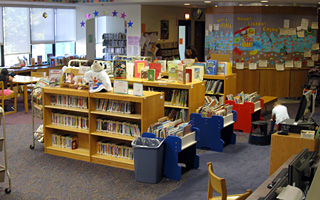 “I would compare [reading] to exercise and fitness. It’s harder to get going when you start later on in life. When you get hooked on reading, it becomes part of your way of life.” – Lisa Kedem, First Grade Reading Teacher at Morse.
“I would compare [reading] to exercise and fitness. It’s harder to get going when you start later on in life. When you get hooked on reading, it becomes part of your way of life.” – Lisa Kedem, First Grade Reading Teacher at Morse.
The ability to read is one of the most fundamental skills in a person’s life. You read at home, at work, at school. You read to stay informed, to learn, to entertain yourself. Reading is ubiquitous. You’re reading right now.
Kedem, who has been working as an elementary school reading specialist for nearly two decades, knows first-hand how important a solid foundation in reading is to child’s entire education. “Everything is interconnected,” she says. “The more you read, the better you write. Also in math today there’s a lot of problem solving, so you really need to be able to read with excellent comprehension to be able to understand those aspects of your education.”
The sooner you encourage your kids to read, the better off they’ll be. Kedem’s job is to get students fired up to read in the first grade. One way she energizes these six and seven-year olds is by steering them towards books on subjects about which they are already passionate. Dinosaurs. Fairies. Magic. Whatever gets their attention. “I think it’s important for kids to read for pleasure as well as information,” she says. At this early stage of a child’s literacy education, just getting them to read is the goal. “It’s not a competition, or a race to the finish line. It’s getting hooked into reading and reading what you love.”
In the Public Schools of the Tarrytowns, students are given an hour and a half of literary instruction a day in grades K-8, part of the district’s research-based model of literacy called Balanced Literacy. “[The program] is really intended to expose children at the earliest ages to… literally, a
balanced approach in terms of the different elements that constitute reading skills,” explains Superintendent Howard Smith. “It’s a very systematic, progressive approach to building a child’s capacity to read, initially, to crack the code of reading and develop a working sight word vocabulary, and as they go up in the grades, increasing the idea of reading with understanding and developing their comprehension skills.”
The district is careful not to try for a one-size-fits-all reading philosophy. They are aware that every child comes into Kindergarten at his or her own level of vocabulary and language skill. “By the time children register for Kindergarten, children in backgrounds where they haven’t been exposed to a lot of language have not built up a significant working vocabulary,” says Smith. “The difference in their working vocabulary can be, literally, thousands of words.”
Kedem says the best way to help your children learn to read and build up their vocabulary is by reading to them yourself. “I think all the children come in [to school] very enthusiastic, wanting to read. Some of the children I work with, some of the [English] literacy-at- home issues can make it a little bit of a challenge. You don’t have to be literate in English. If you’re literate in your own language, you can read to your children, it doesn’t matter what the language is.”
Superintendent Smith sometimes worries that today’s technology is changing the way future generations view reading skills. “There does seem to be a move towards abbreviation in communication,” he says. “Take something like Twitter. The whole premise is that you say whatever there is to say in 140 characters. There’s a whole new kind of language that’s becoming increasingly abbreviated because every character is precious… In the interest of speed and efficiency, people are choosing fewer words to express themselves. As an educator, I find that sad. You lose a lot of the nuances in being able to communicate with each other by doing that.”
I asked Superintendent Smith if he thought today’s students were reading enough. His answer? “No, I don’t think so… kids are not devoting a portion of their time that would be, I think, appropriate in terms of optimizing their capacity to really become literate in a more sophisticated sense of that term.”
In an effort to organize more time for kids to read, the EPTA of the Tarrytowns has teamed up with The Warner Library for Read Out @ Warner — a one-day Read-a-Thon taking place in the Children’s Room of the Warner Library on Saturday, October 9 from noon – 4pm.
Open to all kids in grades K-5, children are encouraged to come in, sit down, and read. Kids can bring in their own books, browse through the library’s collection, or bring a parent, older sibling, or friend to come and read to them. Anyone who wants to help raise money (all proceeds will benefit the Children’s Room) can stop by the library before October 9 and pick up a donation form. Anyone who wants to just take part is welcome to simply drop by and read. There will be a number of special guests stopping by throughout the day, and the Read-a-Thon will be followed by a party on the library’s front lawn.
For more information about Read Out @ Warner, contact Patricia Cohn, Warner Library Children’s Librarian, at 914-631-7734 or your EPTA representative. ©






